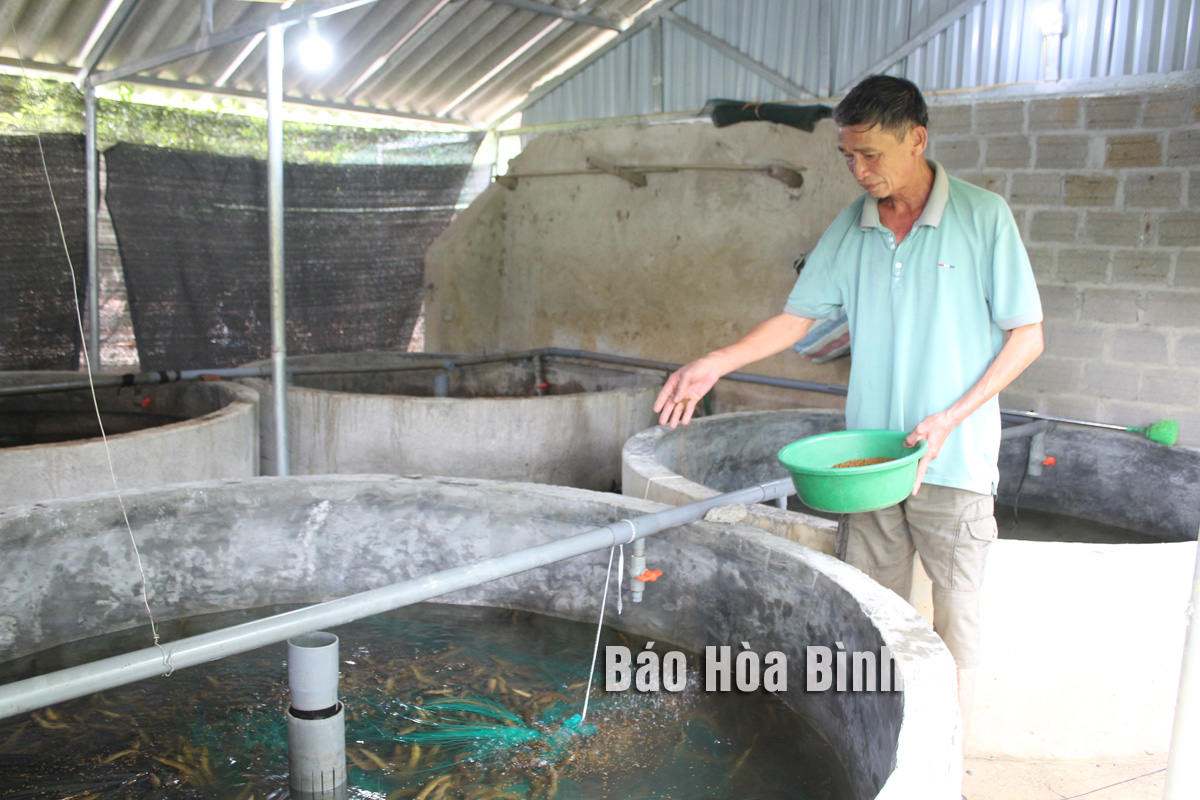
Hoa Binh province has 145 out of the 151 communes, wards, and towns which are ethnic minority-inhabited and mountainous areas, 506 communes facing extreme difficulties, and more than 74% of its population being ethnic minority people.
People in Doan Ket commune, Yen Thuy district invest in a commercial eel farming model along the value chain, thereby increasing their income.
With the locality’s socio-economic characteristics, the government’s three national target programmes on rural development, promoting potential and strengths of regions to produce goods in accordance with value chain, under the umbrella of the National Target Programme on promoting socio-economic development in ethnic minority areas has a significant meaning.
In Hoa Binh, the capital of the National Target Programme during 2021-2025 is allocated to the implementation of many important and practical contents to serve investment needs of ethnic minority areas, such as shortage, domestic water, planning, population settlement; investment in essential infrastructure for production and life; developing education and training, improving the quality of human resources; and building cultural life; medical development, and people's health care.
In particular, the province also prioritises resources integration to raise the implementation efficiency in an attempt to improve agricultural and forestry production development and life of local ethnic minority people.
According to the provincial Committee for Ethnic Minorities, the project has been implemented in the right direction, right subjects with appropriate contents and forms to utilise potential and advantages of each locality in the direction of crop and livestock restructuring, helping create jobs and increase income for people in ethnic minority areas.
By the end of 2023, the rate of poor households in the province, communes in ethnic minority areas and those facing extreme difficulties remained 9.2%, 9.8% and 21.27%, respectively.
Currently, six communes facing extreme difficulties have been recognised to have completed the goals of building new-styled countryside, bringing the total number of communes recognised as meeting the new rural standards and exiting the category of communes facing extreme difficulties in the period of 2021 - 2023 to 14.
These are positive results in efforts to stabilise livelihoods, improve incomes for people in ethnic minority areas, and effectively contribute to creating a facelift for agriculture, farmers and rural areas in the province.
The Department of Education and Training of Hoa Binh province held a conference on March 18 to review the performance of the "Safe and Happy School" Project and set out tasks for 2025. The project, funded by the Taiwan Fund for Children and Families (TFCF), aims to create a safe, inclusive, and supportive learning environment for students. The event saw the attendance of representatives from the TFCF and 26 beneficiary schools.
With over 70% of their workers being women, trade unions across industrial parks (IPs) in Hoa Binh have been actively safeguarding their legal rights and interests while implementing initiatives to improve their income and well-being.
In recent years, the Hoa Binh provincial General Hospital has continuously innovated itself and improved the quality of medical services to meet the increasing needs of local people. With substantial investments in infrastructure and modern equipment, along with a team of highly qualified doctors and nurses, the hospital has gradually established itself as one of the leading medical units in the Northwestern region and a trusted destination for healthcare for people inside and outside the province.
From mastering the fundamentals of programming to achieving national recognition, the Programming Club of the Le Van Tam Primary School (STAR LVT28) in Hoa Binh city has made remarkable strides in the field of robotics.
The Ho Chi Minh Communist Youth Union Committee and the Vietnam Youth Federation chapter of Hoa Binh province organised a programme on March 12 to launch the "Digital Literacy" movement and an online quiz on the resolutions of the Vietnam Youth Federation congresses at all levels, as well as the Politburo's Resolution No. 57-NQ/TW on breakthroughs in the development of science, technology, innovation, and national digital transformation.
As climate change grows more unpredictable, the development of production forests has become essential - not just for economic growth, but for safeguarding the environment and maintaining ecosystem balance. By boosting local incomes, curbing natural disasters, preventing soil erosion, and protecting water resources, these forests play a crucial role in sustainable development.



